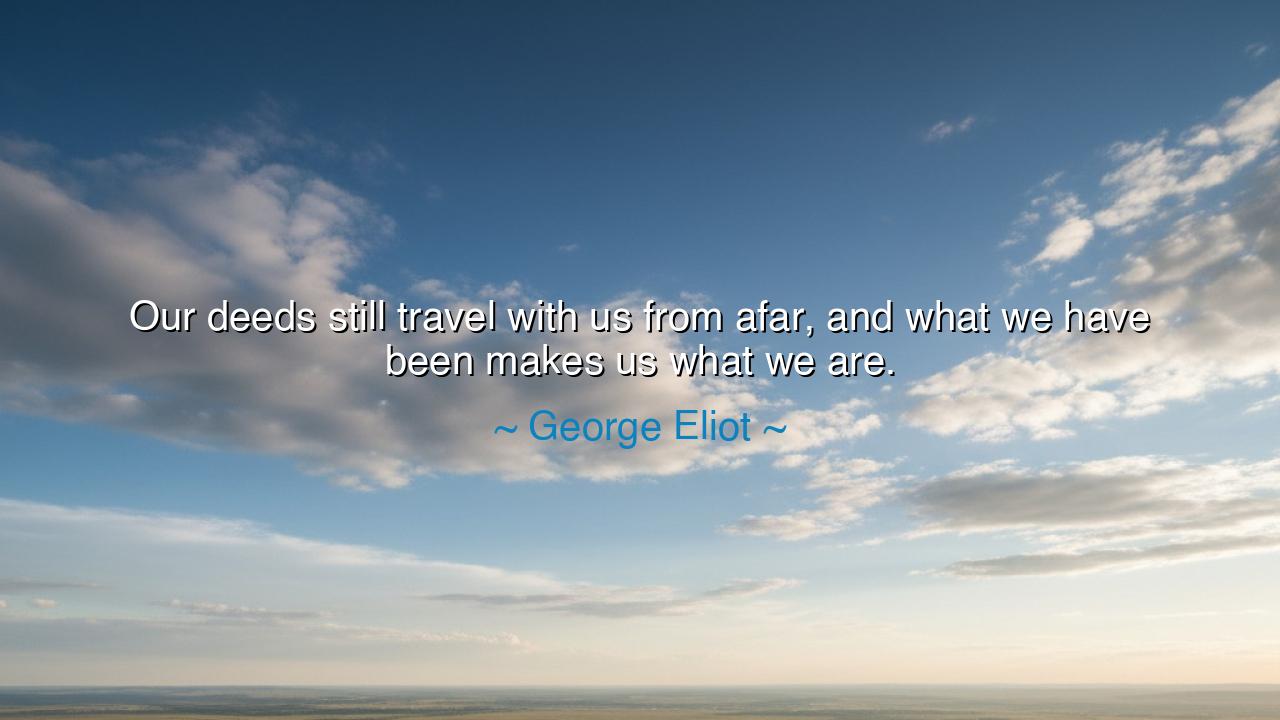
Our deeds still travel with us from afar, and what we have been






The novelist and sage George Eliot once wrote words of enduring power: “Our deeds still travel with us from afar, and what we have been makes us what we are.” In these words lies an ancient wisdom, a truth known by prophets, philosophers, and poets alike—that the past is not dead, but lives within us, shaping our present and our destiny. Every action taken, every word spoken, every choice made—these do not vanish into silence. They echo, they follow, they become the soil from which our future grows.
The phrase “our deeds still travel with us from afar” reminds us that nothing we do is truly forgotten. Like shadows cast by the setting sun, our deeds stretch across time, reaching us long after we believe them gone. A kind word spoken years ago may still bring comfort to a soul; a cruel word may still sting in memory. The ancients knew this law well, calling it karma, destiny, or the inescapable harvest of what we sow. Eliot, in her wisdom, reminds us that the past is never abandoned—it walks beside us, whispering into the present.
When she writes, “what we have been makes us what we are,” she proclaims the truth of identity: that we are built not in a single moment but across a lifetime. The child’s choices, the youth’s passions, the adult’s struggles—all shape the being we become. None of it is wasted, none of it disappears. The warrior is forged by battles endured, the healer by wounds suffered, the sage by errors learned. Who we are today is the sum of all yesterdays, and tomorrow will be shaped by what we choose now.
History offers many examples. Consider Abraham Lincoln, whose early life was marked by hardship, poverty, and repeated failure. Yet these struggles shaped him into the man who, when destiny called, had the strength to guide a fractured nation through civil war. His past did not vanish; it traveled with him, preparing him, forging him. Without those early deeds of persistence and humility, he would not have become the president remembered for wisdom and compassion. Eliot’s words shine through his story: what he had been made him what he was.
The origin of Eliot’s teaching rests in her deep understanding of the moral and spiritual fabric of life. Living in the Victorian age, she saw how society often judged only the surface, forgetting that each person carried within them the weight of past choices and the hidden influence of unseen deeds. Her insight was not born merely from philosophy but from the observation of real human lives—lives shaped, lifted, or destroyed by the long shadows of their own actions.
The lesson for us is clear: live with awareness, for nothing is lost. Every choice matters. Every deed, great or small, travels onward and will meet us again, either as friend or as foe. Let us act, therefore, with kindness, integrity, and courage, so that when our past walks beside us, it strengthens rather than burdens us. To ignore this truth is to stumble blindly into a future built of regret; to embrace it is to walk wisely, shaping a destiny of honor.
Practical action flows naturally from this wisdom. Ask yourself each day: What seed am I planting? Speak words that heal, for they will echo in the hearts of others. Perform deeds that uplift, for they will return to you in ways unseen. When you falter, do not despair, but learn—for even mistakes can become teachers that shape you into someone wiser. Live deliberately, knowing that the smallest act may travel farther than you imagine, touching lives you may never see.
Thus the words of George Eliot endure: “Our deeds still travel with us from afar, and what we have been makes us what we are.” To future generations, let this be remembered not as mere poetry, but as law written into the very fabric of existence. Your past is your companion; your actions are your inheritance. Choose well, and you will walk into the future not burdened, but crowned by the nobility of your deeds.






AAdministratorAdministrator
Welcome, honored guests. Please leave a comment, we will respond soon